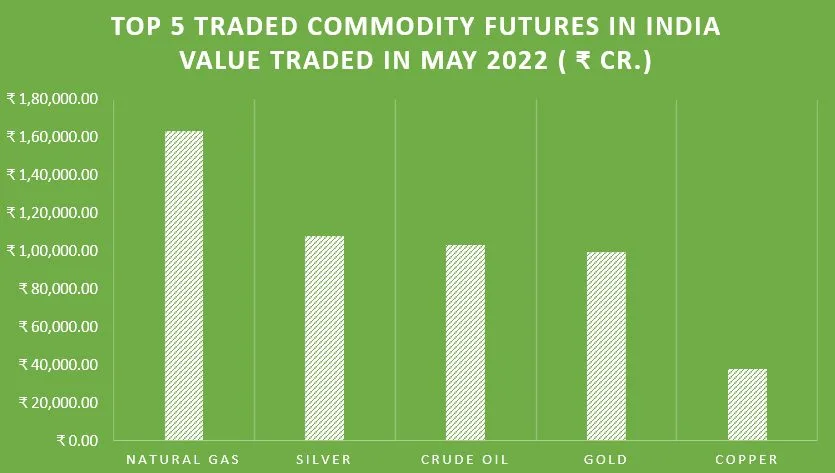How to start commodity trading and make money ?
One might have various reasons. If you are an investor looking for portfolio hedging instruments or a trader looking to diversify and manage risk, commodity trading can serve both purposes well.
Table of Contents
- How to Start Commodity Trading in 7 Steps
- Step 5: Identify the types of contracts in commodity trading.
- Step 6: Know about commodity trading time in India.
- Step 7: Risk Management before you start commodity trading
- Summary
Over the years, the growth of the commodity trading in India for derivative market has been quite impressive. Here’s a quick look at the average daily turnover of the Indian commodity futures market:

Another reason why commodity trading in India is becoming more popular is that the MCX has launched mini contracts for gold and silver. which means you don’t need to trade large-sized gold and silver contracts, which often need higher margin.
You can start commodity trading in India for gold and silver mini contracts from as low as Rs.10000
[Check Margin required for trading in commodities for zerodha]
If you want to start a successful commodity trading business, you’ve come to the right place. This blog will teach you how to start commodity trading step by step and what parameters to consider before making your action plan.
Before you start trading commodities, you should do some preliminary research. Don’t worry, I’ll walk you through it, so let’s just get started and you’ll know what you’ll need to prepare as we go.
How to Start Commodity Trading in 7 Steps
Below 7 step process will tell you how to start commodity trading business and become profitable.
Step 1: Setting objectives to start commodity trading.
The most important aspect of trading is planning. Just as you would not enter a battlefield without a plan, you should never trade without one. Setting objectives for your trading involves each trading instrument type having a clear objective.
For example, in the case of commodity trading, you should clearly define why you are trading commodities in the first place? What is your main goal? Are you trading commodities for hedging, or are you a trader whose sole trading market is commodities?
You may be wondering how these things will benefit you right now, before you enter any market.
Let me start with the best advice: always prioritize money management when trading, and it is for money management that you should ask these questions, so that when it comes to allocating money in different markets, there are no mistakes that result in huge losses.
[ Read : Trading For Beginners: Top 5 Things To Know Before You Start]
Step 2: Find brokers to start commodity trading.
The brokerage world is becoming more competitive; take advantage of it by doing proper research on brokerage charges. Remember that while brokerage charges for single orders may appear low, they add up quickly if you are a high-frequency trader, so choosing a discounted broker can save you a lot of money in the long run.
Aside from the brokerage charges, you should also consider the customer service and support of the brokers you are looking for . Keep in mind that any type of trading activity involves various types of risks, such as liquidity risk and margin penalties, which a responsible broker will assist you with.
Many performance indicators are involved with broker choosing see whole post on Best Commodity Brokers in India : Top Commodity Brokers in 2022
Finally, ensure that your broker is registered in the Commodity Derivative Segment of SEBI.
[This is a list of all brokerage firms in India that are SEBI registered for commodity trading].
Step 3: DEMAT account to get started in commodity trading
Like for stocks and forex trading, you need a Demat account for trading in commodities. Nowadays, all demat account opening processes are online and you need to fill in the forms and submit them online.
Documents Required:
The following are the minimum required documents:
For KYC-Proof of identity and address ( Aadhar card/Passport/Voter id/Pan Card)
To be eligible for commodity trading, you must provide any of the following proofs of income for commodity segment activation:
- Bank statement of 6 months
- Form 16
- The latest salary slip
- ITR acknowledgement
- Certificate of Net Worth
Once your documents have been verified and you have successfully submitted the online form, brokers will review the information and, if everything is in order, your account will be activated within 48 working hours.
Step 4: Identify the types of commodities to trade.

When it comes to commodity trading, there are numerous options available. One important consideration when making such a decision should be the liquidity and risk profile, which I will explain briefly but first look at. The classification of major commodities traded in India:
Commodity Index :
Commodity indexes, like equity indexes, track the performance of specific commodities.
The available commodity indexes in India are-
METLDEX- MCXMETLDEX tracks the real-time performance of five base metals futures contracts: zinc, copper, nickel, lead, and aluminum.
ENRGDEX – MCXENRGDEX monitors the performance of liquid crude oil and natural gas futures.
BULLDEX- MCXBULLDEX monitors the performance of liquid gold and silver futures.
Bullion :
Bullion commodities are instruments available to trade in gold and silver. The following bullion contracts are currently available: gold, gold mini, gold guinea, gold petal, silver, silver mini, silver micro.
Base Metals :
Base metals available for trading are : aluminum, copper, lead, zinc, and nickel.
Energy :
Natural gas and crude oil are the two energy commodities traded in India.
Agri-commodities
Cotton, palm oil, kapas, mentha oil, and rubber are all agricultural commodities that can be traded.
[Read :Types Of Trading: Which Type of Trading is More Profitable?]
Step 5: Identify the types of contracts in commodity trading.
Commodities can be traded using two types of contracts:
Future contracts :
Future contracts are a popular type of contract for commodity trading. Each commodity traded in the market has an expiry date, and as of the time of writing this article, all commodity futures expire monthly in India. Speculators buy or sell future contracts based on their analysis.
Option Contracts :
Commodity options are new to the Indian commodity markets; SEBI introduced commodity options in June 2017.
[All clear for commodity options; Sebi notifies criterion, fixes limits]
Step 6: Know about commodity trading time in India.
Another thing to keep in mind in the commodities market is that the opening and closing times differ.
Opening Time: 9:00 AM
Closing Time: 11:30 PM (bullions, metals, energy) | 5:00 PM ( Agri-commodities) | 9:00 PM (International referenceable Agri-commodities)
[Latest Trade timing of commodity markets]
Step 7: Risk Management before you start commodity trading
Once you’ve gone through all of the above considerations, it’s time to take action. However, no trading should be done without proper trade planning and risk management, and commodity trading is no exception.
The following points should be considered in your trade planning and risk management:
- Analysis of markets: fundamental prospective
- Analysis of markets: technical perspective
- Position sizing and account management.
- Checking margin requirements ( Zerodha Margin calculator)
- Checking the expiry of contracts
- Choosing a trading time frame: intraday or carrying overnight positions.
- Risk analysis and mitigation (calculating how much risk you are taking per position).
- Hedging considerations—if applicable.
- Liquidity considerations (never trade illiquid contracts).
Summary
- Commodity trading provides diversification opportunities for investors and traders, as well as better portfolio management.
- Due to mini and micro lots availability, commodity trading in India is getting popular.
- Setting trading objectives is critical to starting commodity trading because they aid in account management and better planning.
- It is critical to investigate all available options for finding brokers because you may want to reduce your costs while also requiring assistance from your brokerage firm in the event of unexpected risk factors arising due to margin penalty and liquidity issues.
- Carefully explore all available options for trading instruments for commodity markets.
- Commodity trading with proper planning and risk management will ensure a profitable future.
At Bulls Arena Trading
info@bullsarenatrading
New Delhi
India







